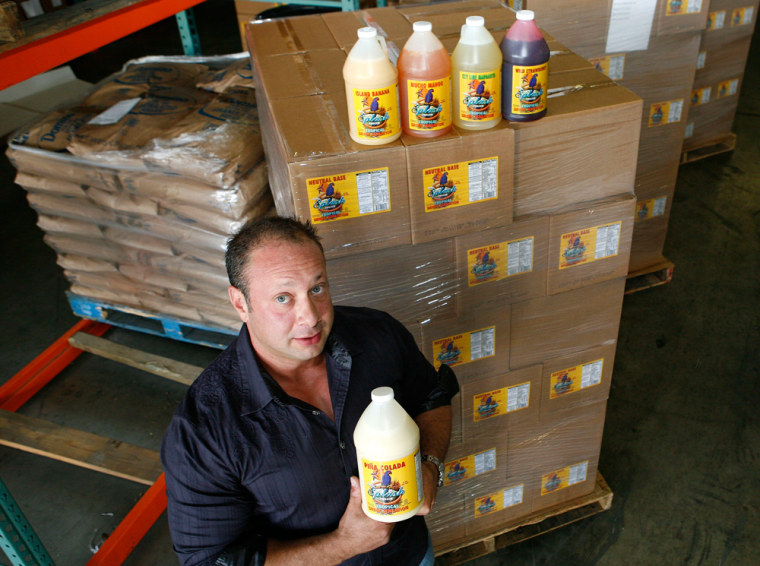Jugs of daiquiri mix. Gourmet nuts. Rolls of newsprint. Not exactly humanitarian aid, but still among the items sold to Cuba under an agricultural waiver carved out of the decades-old U.S. trade embargo.
American businesses are raking in more than $700 million a year selling these and other products to the Cuban government under the waiver, which was passed by Congress partly on humanitarian grounds and signed in 2000 by President Bill Clinton.
Backers said the measure would expand U.S. markets and help the communist country feed its people. And the waiver has accomplished that, with huge shipments of grain, chicken and other products.
Some of the goods, though, wind up in a select group of supermarkets where few Cubans can shop, or in the island's exclusive resorts and hotels, which most Cubans can't visit.
As President Barack Obama calls for a fresh start in U.S.-Cuban relations, sales of high-end treats and other seemingly nonessential items highlight the inconsistencies in the current American policy.
"It's hypocritical both ways," said Andy Gomez, a Cuba expert at the University of Miami. "From the U.S. side, it was done by the administration to help certain members of Congress who wanted the sales. But from the Cuba side, it shows that the U.S. embargo is not really what is hurting the Cuban people."
Exotic opportunities
The embargo was imposed in 1961 at the height of the Cold War, but that hasn't kept the U.S. from becoming Cuba's largest foreign source of agricultural products. The waiver, which was championed by politicians from agricultural states, covers hundreds of categories, including wood-related and medical products, though the biggest sales to Cuba last year were still the basics — $196 million in corn, $139 million in poultry and $135 million in wheat, according to the Census Bureau.
Rep. Joanne Emerson, R-Mo., one of the waiver's original backers, said that lawmakers at the time weren't focused on deciding item-by-item which products to allow and which ones to disallow.
"When you get to the weeds, I don't think that's a good thing," she said, adding, "The more products we can sell to the island, the better."
The waiver has created all kinds of exotic opportunities for American businesses.
One of the first U.S. companies to sign a deal with Cuba was not an agriculture giant sending grain from the heartland. It was a drink mix company in Fort Lauderdale.
Rich Waltzer, owner of Splash Tropical Drinks, frequently provides the mixes for the daiquiris and margaritas tourists sip at Havana's legendary Hotel Nacional.
The daiquiri is believed to have been created in Cuba about a century ago; the rum drink apparently got its name from a beach and an iron mine in Cuba. While the notion of sending daiquiris to Cuba might seem comical, Waltzer said Cuban officials liked the predictability of his product, and besides, they don't grow strawberries in Cuba.
"When I started, the only thing I knew about Cuba was Fidel Castro, the Cuban missile crisis, rum and cigars," said the Brooklyn-bred Waltzer.
Waltzer and other entrepreneurs are pretty happy with the way things are now. The waiver is so broad that it includes beer, soda and a host of inedible items such as beauty products, artwork, utility poles, kitchen cabinets and Alabama newsprint, which totaled $6 million in sales last year.
Cheesecake next?
Alabama Agriculture Commissioner Ron Sparks said the newsprint has been used for Cuba's government-run papers — in which diatribes against the U.S. embargo are frequent. Officials at the Communist Party newspaper Granma and the Cuban government did not return calls from The Associated Press.
"Agricultural groups have about 90 percent of what they want," said Dan Erikson, author of "The Cuba Wars: Fidel Castro, the United States and the Next Revolution."
But what agricultural groups would really like is more Americans visiting the island. Under U.S. law, only Cuban-Americans and a few groups such as journalists and academics are allowed to visit Cuba. More tourists from the U.S. would mean more demand for food items, especially higher-priced products and American brands.
Frank Walker, a food company representative who went to Cuba last year representing Texas manufacturers, is securing contracts with Cuba for a variety of upscale products, including New York-style cheesecake, key lime pie and a rum-infused bundt cake.
"My products are driven by the tourist industry and food trade," Walker said.
James Cason, former head of the U.S. Interests Section in Havana under President George W. Bush, said ending the trade embargo would hurt the bargaining position of the U.S., which is hoping to prod Cuba to allow more freedom for its citizens.
"There will come a time when the Castros are done," he said. "Then the embargo will have some leverage."
In the meantime, the sale of the luxury goods demonstrates that at least some basic laws of the market work even in a communist country like Cuba, Erickson said: "If daiquiri mix sells in Cuba, then daiquiri mix is what's going to go."
